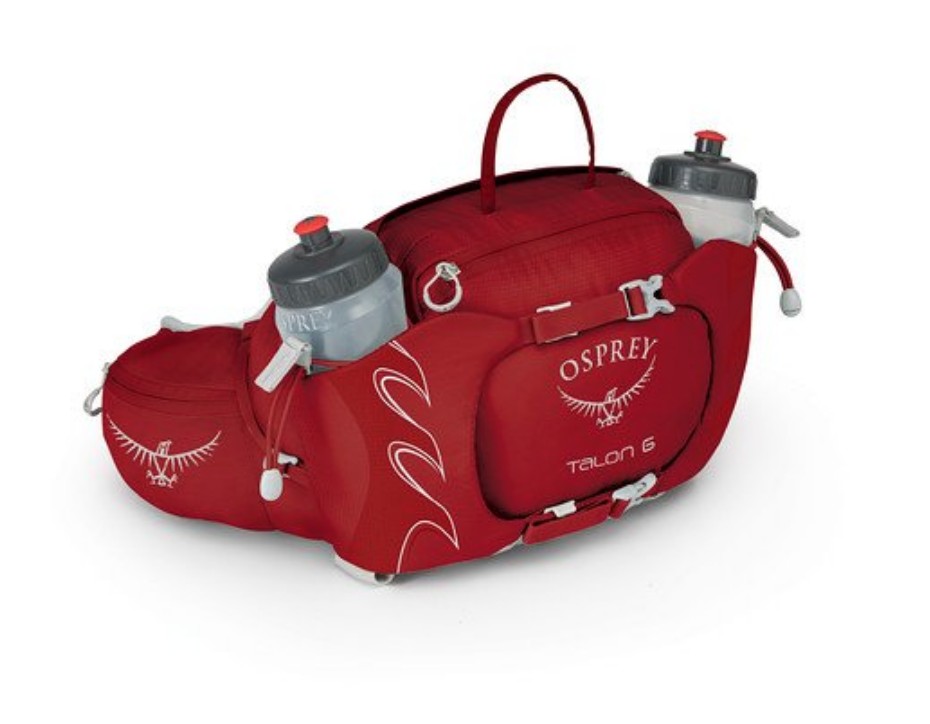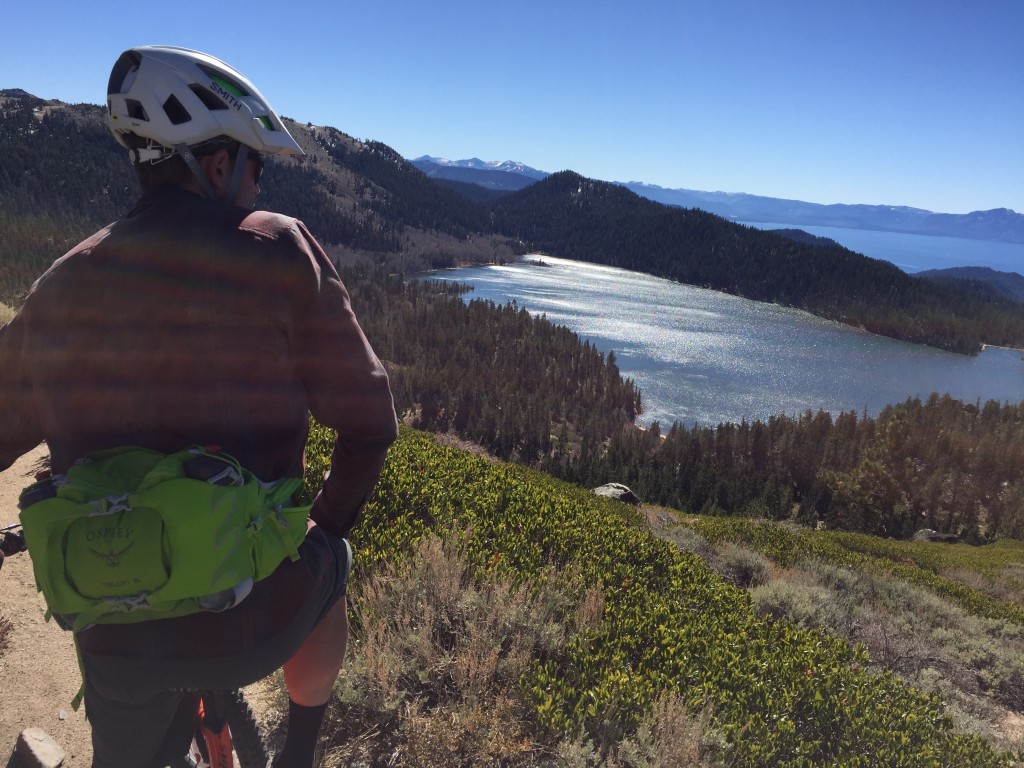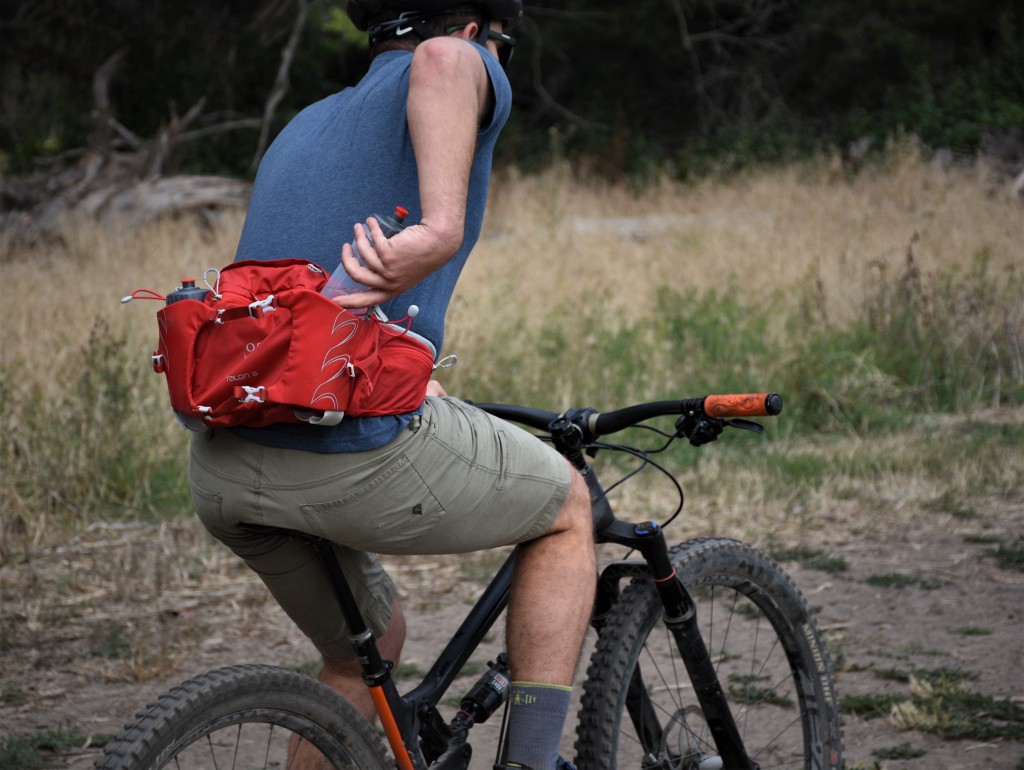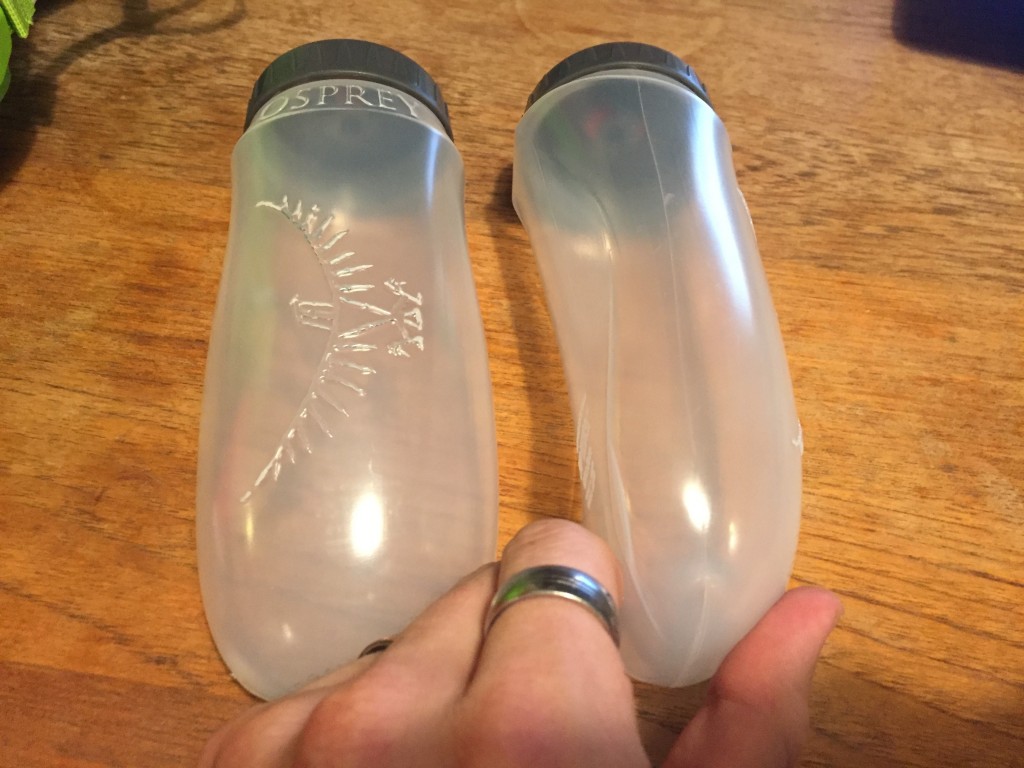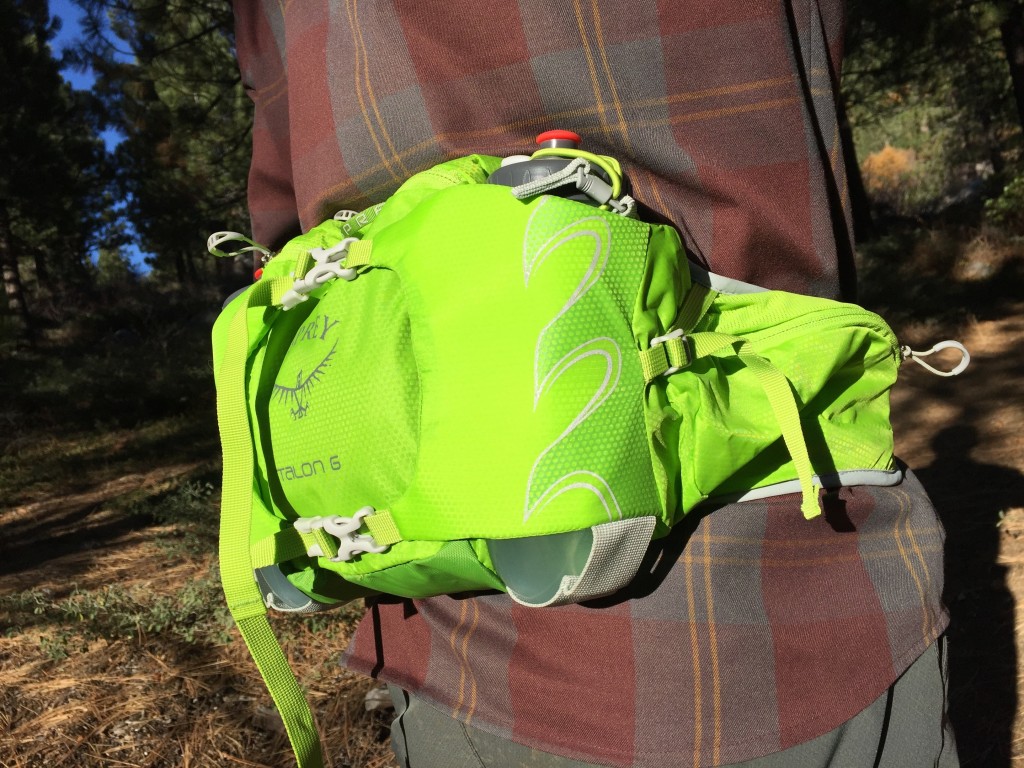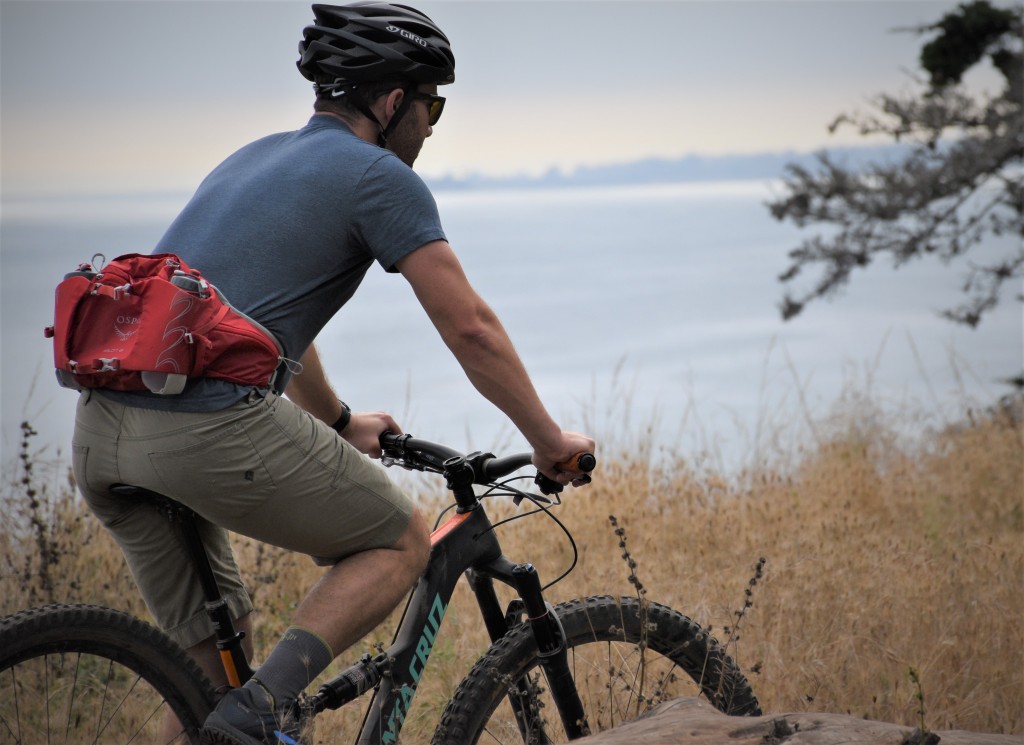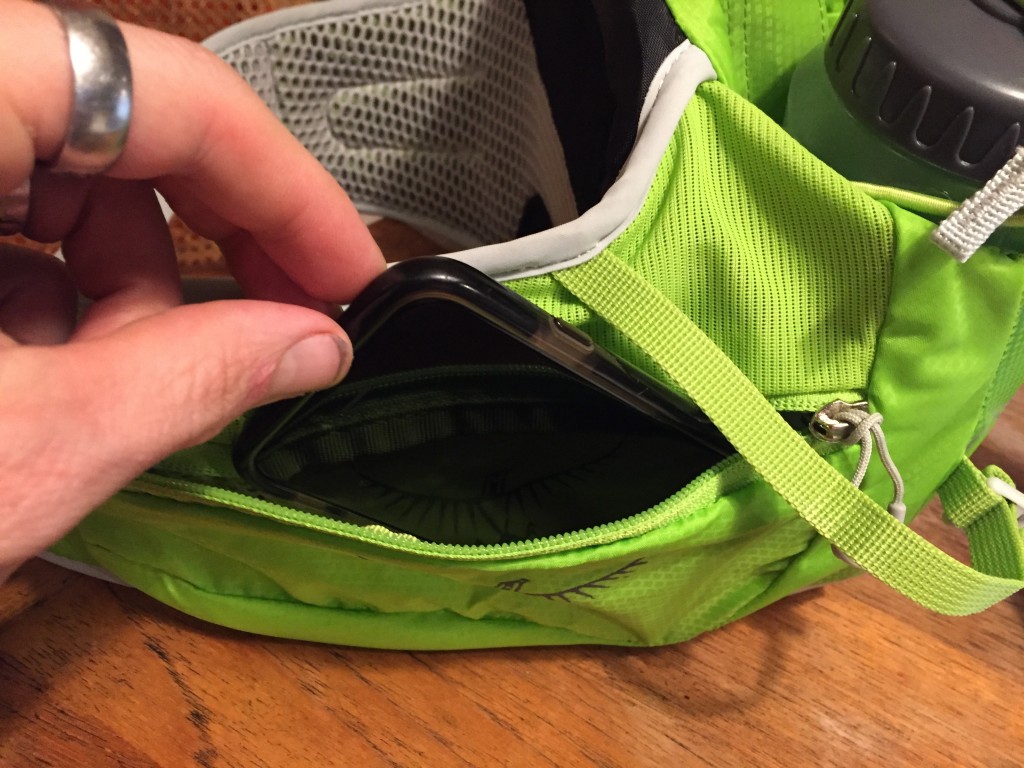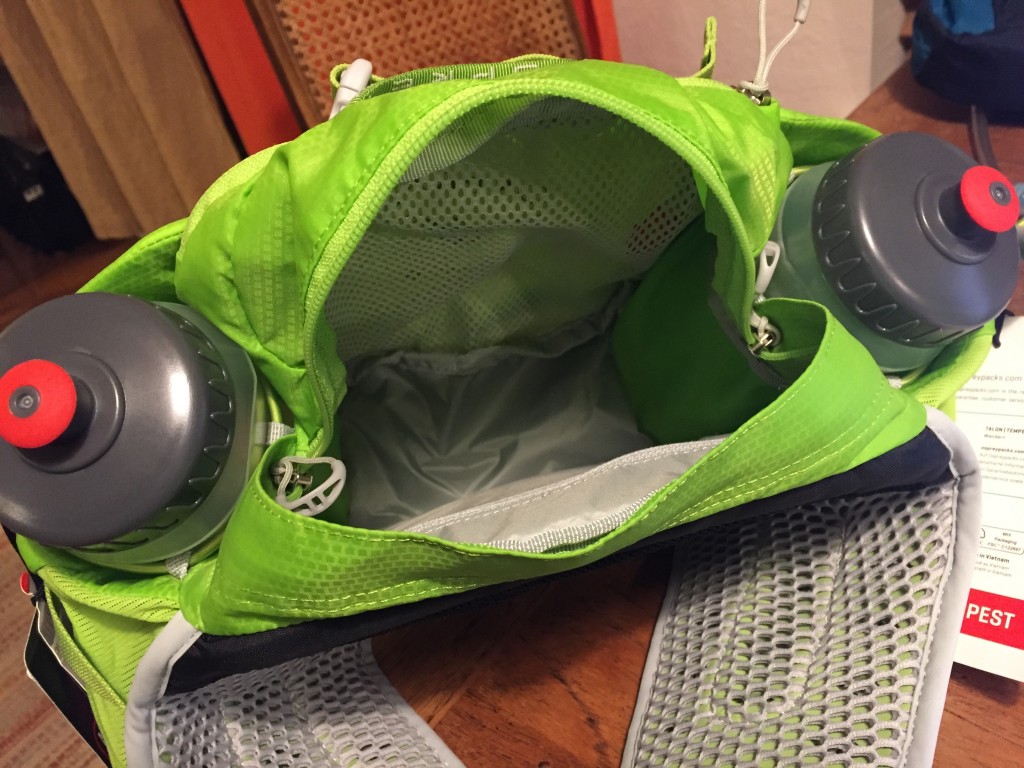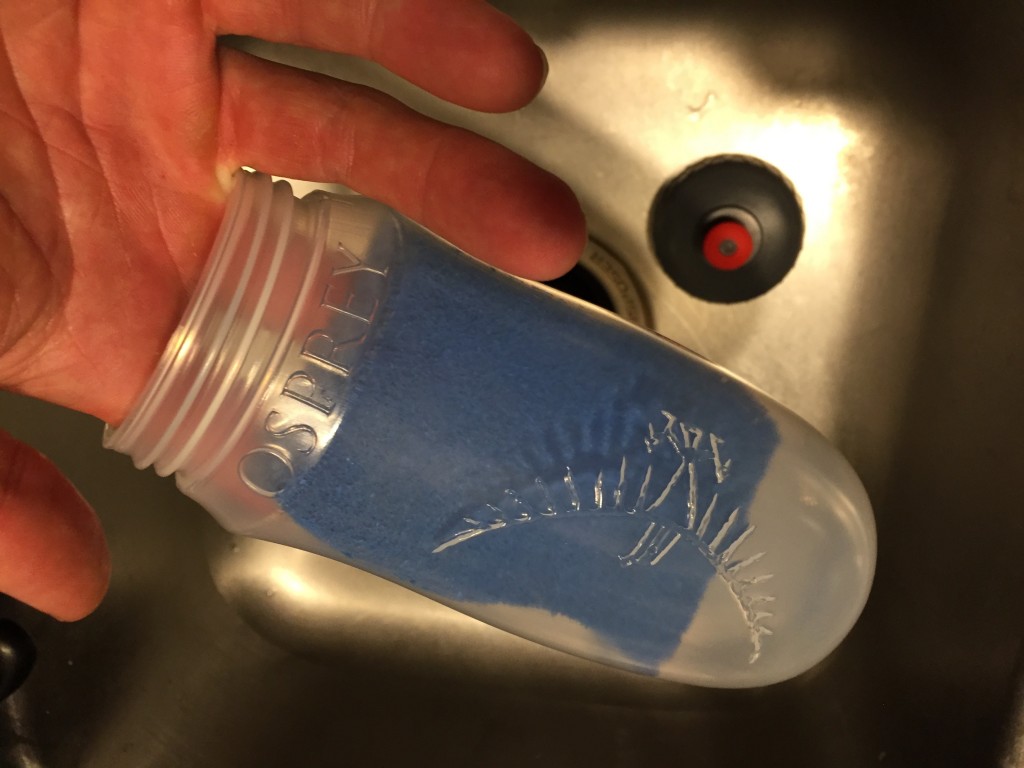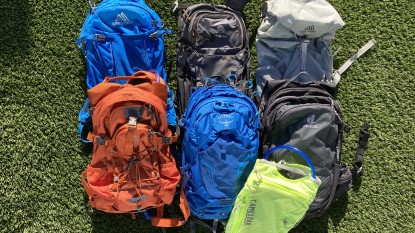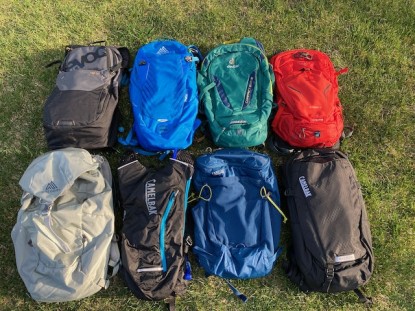Osprey Talon 6 Review
Our Verdict
Our Analysis and Test Results
We tested the Osprey Talon 6 on both day hikes and mountain bike rides. One of the three lumbar packs we reviewed, we found it to be best suited to hiking. The two included 20 oz water bottles make up the water storage of the Talon 6 and don't interfere with the pack's 6-liter storage capacity. The lightweight pack is well ventilated like all Osprey packs and fits very comfortably when standing upright; however, we found it to be somewhat awkward when we tested it on our mountain bike.
Performance Comparison
Ease of Drinking
The Talon 6 is the only hydration pack in our test selection that employs water bottles for water storage, as opposed to a water bladder and drinking hose. Each Osprey Hydraulics Pack bottle holds 20 oz of water, for a total storage capacity of 40 oz, or 1.14 liters. We did find the water bottles to be very easy to use and drink from. Taking a drink is as simple as reaching behind you and pulling a bottle out of its sleeve before putting it up to your mouth, pulling the nozzle open with your teeth and squeezing water out of it. While it is by no means a challenge to drink from these bottles, it does involve the additional step of pulling the bottle out from behind you and replacing it after drinking, and it is less convenient than using a hydration bladder with a drinking hose and bite valve.
The bottles are held in padded sleeves, one on either side of the main storage compartment, which is dedicated to that purpose. Each bottle sleeve has a small bungee at the top that is designed to cinch around the bottle, and the loose end can be looped over the nozzle on top of the bottle to further secure it in place. When using the bungees to secure the bottles in the pack you also have the additional step of unhooking the bungee from around the nozzle to remove it.
The flow rate of the nozzles on the tops of the bottles was a little harder to quantify than the hydration bladders and their bite valves. The over-the-sink hang test didn't work for the water bottles, so real-world testing was the only way to see how they worked. The rate the water comes out of the containers is dependent on how hard you squeeze the bottle, and even then only so much water comes out per squeeze until you need to reset the bottle and squeeze it again.
It took six full squeezes to empty one of the bottles into the sink. This is not as easy as sucking water out of a bladder through a tube, and the water bottles maintain their size and shape even when empty, unlike water bladders that shrink down to almost no volume when emptied. This contender fell towards the bottom of the spectrum regarding ease of drinking. Those that wish to purchase a larger pack that is easy to drink from may want to consider the Camelbak M.U.L.E., Camelbak Rogue, or Camelbak Classic.
Ease of Filling
Filling the included Osprey Hydraulics Pack bottles of the Talon 6 is about as easy as it gets. Just unscrew the top, fill the bottle, and screw the top back on. It's nearly as straightforward as they come, and you don't have any potentially leaky bladder closures to worry about. There are two bottles to fill, so that adds a step, but that's just being nit-picky.
The included water bottles are molded in a teardrop shape, a shape that is designed to contour around the storage compartment to maximize its capacity. While this design integrates well into the pack, it prevents the bottles from standing up on their own. We didn't find this to be a deal breaker, but it can be slightly inconvenient and takes a little getting used to.
Earning a high score in this metric, this model comes highly recommended for those interested in a fanny-pack style that is easy to fill. If you've decided that a fanny-pack is not the best for your riding or hiking, we'd opt for the Osprey Syncro 12, which is a touch bigger, or any of the Camelbak models.
Comfort
Osprey claims the intended uses of the Talon 6 to be day hiking, trail running, and cross-country skiing. For these types of activities, where your back is kept in a straight position, we found the pack to be quite comfortable. It seems to us that the pack was designed around this body position as the intended uses listed above would also suggest. We took the Talon 6 out for numerous mountain bike rides as well, and we found it to be far less comfortable when worn in the broken-at-the-waist position that one has while seated on a bike.
The lumbar panel of the pack features a semi-rigid piece of foam that provides some basic structure for the main storage compartment. This section of foam also has a series of vertically oriented soft foam ridges on the side that presses up against your back with breathable mesh attached to allow for maximum ventilation. The hip straps of the Talon 6 are a seamless continuation of the back panel, they are quite broad and made with soft perforated foam inside and breathable mesh on the body-side of the straps. It is quite apparent that Osprey takes ventilation seriously, and we found the Talon 6 to allow for more breathability than the Dakine Hot Laps 5L.
The pack's wide hip straps wrap around the waist, and the one-inch wide nylon webbing is then secured with a plastic buckle on the front. The nylon webbing is adjustable from both sides to dial in the fit to your liking. While this attachment style is pretty standard, we found the one-inch width of the nylon webbing to be a little lacking and narrow for a pack of this type. With all of the weight of the pack being supported by the waist strap, we feel that a broader sized webbing would handle the load better and distribute the pressure more evenly across the stomach providing for more comfort, especially when using this pack for mountain biking.
When fully loaded with two full water bottles and a variety of snacks, a light jacket, bike tubes, etc., the Talon 6 was comfortable in the upright position. There wasn't undue pressure on the stomach, and on short hikes, you'd almost forget that it's even there. This was not the case, however, when we took it out for mountain bike rides. When bent at the waist, we found the pack to feel top heavy, leaning off of our back putting extra pressure on our stomach and making for a relatively uncomfortable riding experience. We did find that as the weight of the pack decreased, as we emptied our water bottles, the comfort level of the pack increased.
Competitors that topped the comfort charts and offer a bigger sized pack include the Platypus Duthie A.M., our Editors' Choice winner, as well as the Osprey Syncro 12 and Deuter Compact EXP.
Storage
The Talon 6 offers six liters of storage capacity, which we feel is a lot for this style of pack. The primary storage is in the large main compartment which sits between the two water bottles against the back in the center of the pack. This main compartment is approximately 8x6x4 inches. Also centered in the pack, there is another much skinnier outer compartment separated from the main compartment by mesh that has a separate zipper as well as a key clip. Both sides of the hip belt have generous zippered pockets that are ideal for items like snacks and are large enough to hold a smartphone or small point and shoot camera.
The storage compartments are all relatively basic; there aren't any organization pockets to keep things like mountain bike tools from bouncing all around. That being said, there is plenty of room to carry a light jacket, extra layers, first aid, food, as well as mountain biking paraphernalia. There are also a couple of buckled compression straps centered on the outermost part of the pack that can be used to attach larger items to the outside. These straps are also used to compress the load slightly, as are a couple of adjustable straps on each side of the hip belt that further tightens down the load. That said, the Talon 6 doesn't compress much, and the pack maintains its relatively large profile even when not fully loaded.
The two 20-oz included Osprey Hydraulics Pack bottles make up all the water storage of the Talon 6, giving it the least capacity of any pack in our test selection. The 40oz, or 1.14 liter, water carrying capacity make this pack best suited to shorter day hikes, mountain bike rides, or people who just don't drink a lot of water. If more storage is something that tops your charts and is necessary, you might want to consider the Deuter Compact EXP 12, which scored the only 10 out of 10 in the test. Other top scorers for storage are the Platypus Duthie A.M. and Gregory Nano 18 H2O.
Ease of Cleaning
The Osprey Hydraulics Pack bottles aren't the easiest to clean, but we feel they are about as easy as a water bladder. Other than the unique shape, these containers are cleaned in precisely the same way you would clean a cycling water bottle. The tops unscrew entirely, and the mouth of the bottle has a diameter of 2.25 inches. While you can't exactly fit your hand in there, you can reach in with your fingers and get a sponge most of the way to the bottom. A cleaning brush with a longer handle is the ideal way to clean these bottles and makes life easier. The lids must also be cleaned, but that is also quite easy. One of the nice things about water bottles is that there is no difficult-to-clean hose or bite valve that is likely to hold onto and hide bacteria.
Best Applications
This pack carries the essentials comfortably for activities where your back is primarily in an upright position. We feel that the Talon 6 is best suited to shorter length day hikes due to the 6-liter storage capacity and limited water carrying capability. While we wouldn't recommend this as a mountain bike specific pack, it can certainly be used for that purpose from time to time.
Value
At a retail price of $75.00, we feel that the Osprey Talon 6 is a good value for the right consumer. It is a well-made product, as are most Osprey packs, with great attention to detail and quality craftsmanship. This pack is lightweight, well ventilated, and offers adequate storage for minimalist day hikers.
Conclusion
Overall, we were impressed with the Talon 6, especially for use as a hiking pack. While it wouldn't be our first choice for mountain bike rides it still works for that application. The water bottles are easy enough to drink from and to clean, and the storage capacity is certainly adequate for short trips into the mountains.


